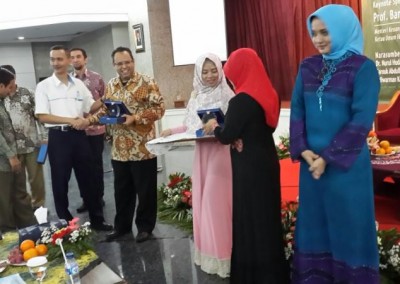The launching of CISFED was held on 10 February 2009 in Financial Club, Niaga Tower, Jakarta. The event also had the launching and discussion of the book “Akuntansi Syariah” (Shariah Accounting) [agar dapat di-create link di-sini untuk mengakses ringkasan buku yang ada] written by one CISFED Board. There are more than 200 people across backgrounds from entrepreneurs, Islamic finance practitioners, academics, and students attended the launching of CISFED. The event was covered by a number of Indonesian national media among others Republika, Media Indonesia, Neraca, and MetroNew [agar dapat di-create link di-sini untuk melihat berita yang ada]. In his opening speech [agar dapat di-create link di-sini untuk melihat “full speech”], the Chairman of CISFED talked about the financial crisis in the US and Europe, the development issues in a developing country like Indonesia, a quest for an alternative paradigm on Finance, Economic, and Development, and the attempt of CISFED to offer an alternative thought by infusing intellectual, moral and spiritual spirit of Islam into the modern concept of finance, economics, and development.
Discussion in CISFED Secretariat in Jln. Ubud No. 3, Embassy District Kuningan, Jakarta on 6 August 2010 on the topics related to “How Islamic is the Islamic Banks.” This discussion that featured Burhanuddin Abdullah (ex-the Governor of the Central Bank) and Farouk A. Alwyni (CISFED Chairman) was moderated by Saat Suharto (CISFED Director). It discussed on the need to integrate the form and the substance of Islamic Banks. Without the substance, Islamic banking will only just be another bank with some Arabic terms. Islamic banking is expected to have uniqueness and be able to make impact to the society. Profit for Islamic banks is of course important since it will ensure its sustainability, but it is not everything. There has to be other bigger objective than just making profit. It should in the first place add value to the society and set up an exemplary model in term of ethics, fair dealing, innovation, and services.
Discussion in the University of Bakrie on 3 March 2012 with the theme “Islamic Economy & Social Justice.” The discussion was opened officially by Tony Bambang Trihartanto, MSc, PhD, Dean of the Faculty of Economics of the University of Bakrie. Erlangga, who was known as an Islamic political activist during the era of the New Order Government, and Farouk A. Alwyni, Chairman of CISFED were the speakers during this discussion moderated by Deddy Herdiansjah, Ph.D., Director, Management Program of the University of Bakrie. The speakers basically discussed the concept of social justice in Islam. The growth of Islamic finance has to be accompanied with the substance of Islamic finance, which is the creation of more equitable society. The Maqasid Shariah (Objectives of the Shariah) is the central theme in the Islamic Economy. Thus, the application of the Shariah in the areas of finance, economics, and development is expected to bring about more ethical society, more fair dealing, more equality, better social safety net, and service-oriented government.



